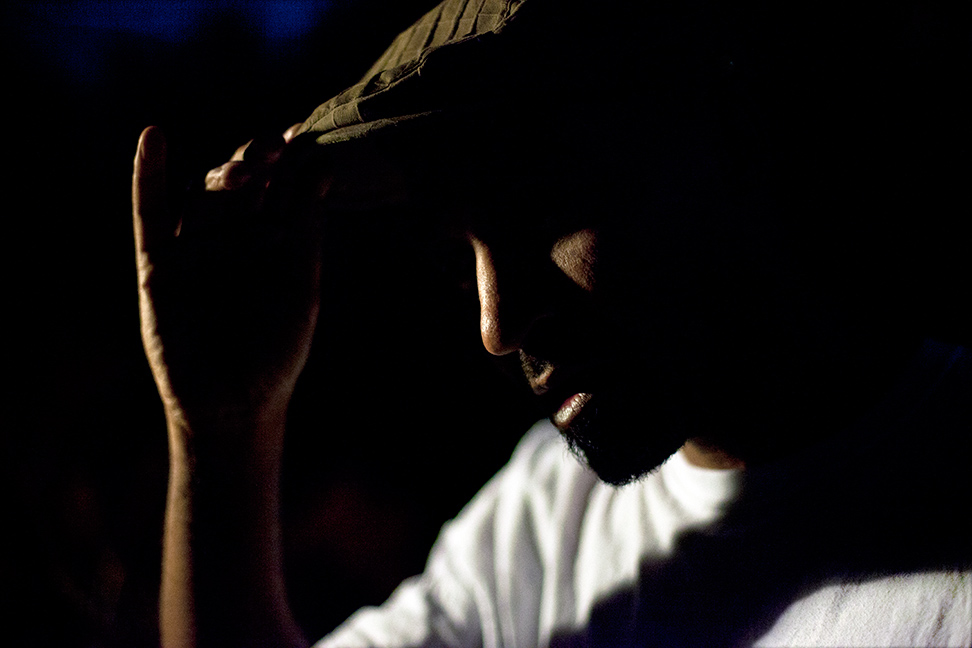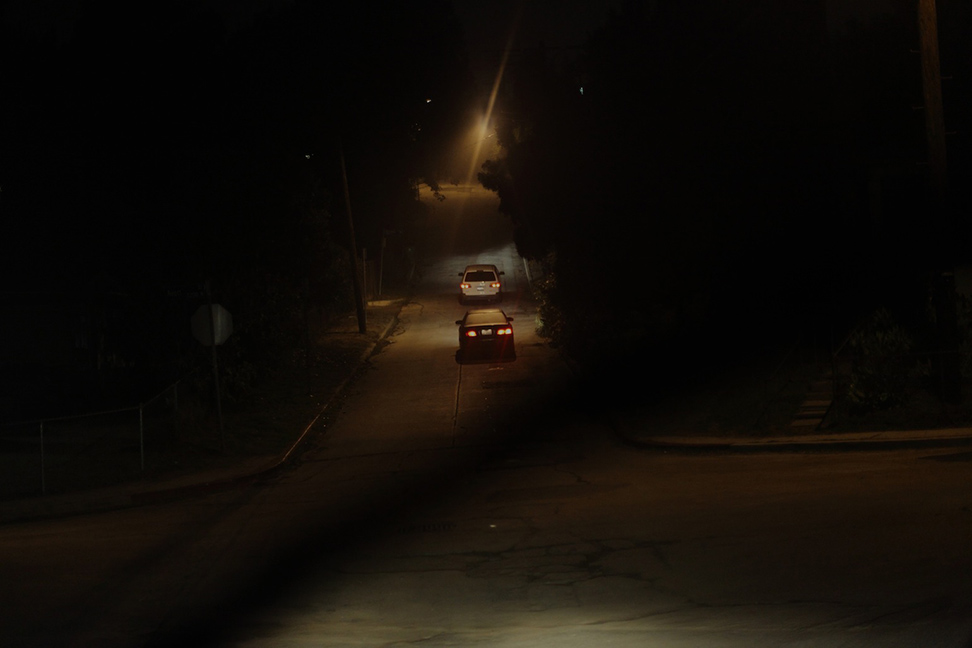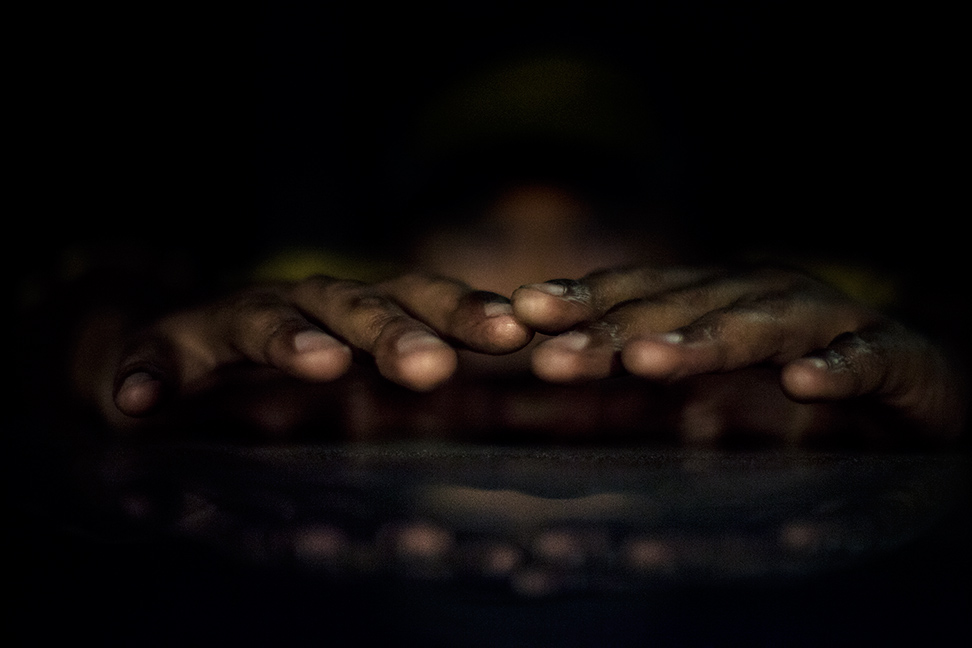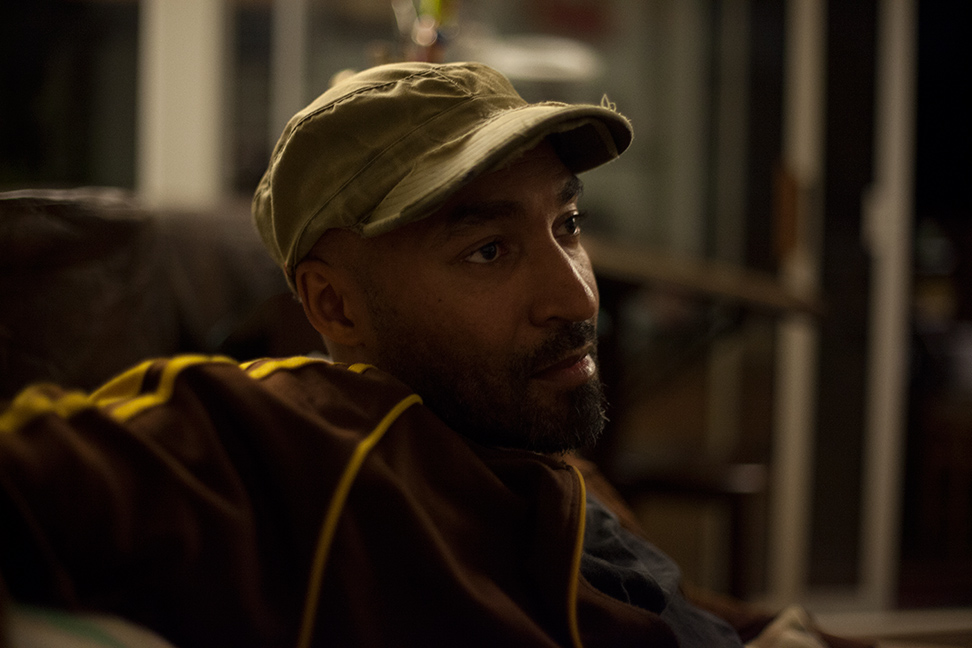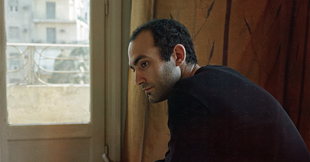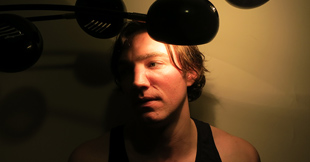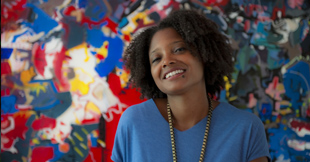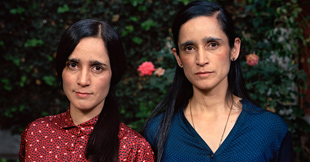
Yeofi Andoh has been recording for years under his own name and the moniker “A Race of Angels,” but for me he was a new discovery; a new sound with an instant hook. Listening to his music is like taking a trip – you don’t know where you’re going but you let go and just enjoy every aspect of the ride. His songs: “Echoes Eternal Soul” starts with slow dreamy vocals, synthesized keyboards and wobbly distorted guitar punctuated with a haunting violin arrangement. “Inside Love,” reminds me of that 70’s Shuggy Otis/Brother’s Johnson vibe. “Just Begin” has a jazz texture complete with stand up bass and Coltrane(like) saxophone. It almost sounds as if it was recorded live at Blue Note in its heyday. The mix of sounds is heady: techno with jazz, trip hop with scatting vocals – all of which are upfront, in your face and sometimes pleadingly intimate.
He grew up in Wooton-under-Edge, a small village in the West Country of England; small as in a population of fewer than one thousand people. Big ideas often come from small places.
We meet at the Malibu Farm Café on the pier, with the ocean and blue cloudless sky a splendid backdrop for our conversation. He arrived before me and managed to get the best table in the house with the best views. We enjoyed coffee and Swedish pancakes, the house specialty. Yeofi appears reserved, exceptionally polite, modest, and very English, as they say. As he talked about his music and his ideas about life he became more passionate. Some of his music for the upcoming release can currently be found in demo form on YouTube.
When did you leave England?
I left in 1992 for New York. I was in New York for about three years and then came out here. I think it was in the middle of the 11th storm watch in New York. I was freezing and a friend of mine said, “Hey, I’m in LA, come out and say hi.” I did – beautiful weather, palm trees, I was like, ok, I need to be here. I love the weather, I mean, I can’t lie, that’s the thing that just keeps me here, and the fact that there is a hub here where you can make music and be involved in the entertainment industry. I come from England where it’s grey and raining all the time.
Do you record lo-fi or in a full studio?
Depending on what I’m doing. If I’m doing real strings then I try to get into a studio space. I have a home studio where I can do a lot of pre-production and then if I need to really knuckle down on something I’ll go into a studio, and clean it up.
What instruments do you play?
I play guitar, keyboards, bass, I produce, and I mean I do whatever. I can turn my hand at pretty much anything.
What did you start with?
Guitar. My dad is Ghanaian. It’s really strange, for a West African, he loved folk music. So, in England he was a member of Ceilidh bands, which are kind of like local folk music.
[Ceilidh bands have both Irish and Scottish roots. Ceilidh socials or dances go back to the 1800’s and often include storytelling.]
So it’s interesting, because he’s West African, but he always said there actually is a connection between some of the West African folk music and folk music of Europe.
I think it’s all, in my opinion, pagan music or music of the earth, and it has the same rhythms.
Exactly, I completely agree with that. I think there are natural rhythms that come out direct from the earth and from our Beings, so people around the world find them and catch them. The similarity is there for sure.
Was he a professional musician?
No, he was an accountant but that was his love. I picked up the guitar – it was just always there. Then suddenly, I think when I was 8 or 9 when I first heard a David Bowie record. I was like whoa, this is it, or what is this? From then on, as a young child, I was really obsessed with David Bowie. I think his uniqueness appealed to me, the fact that he was a bit of an anomaly yet he was embraced.
It married a contradiction within me. Living in rural England, with my sister as the only black kids around, someone that was an anomaly yet embraced, was important to my psyche. Bowie was my first entrance in, then I got into punk rock, which was going on at the time. It was unconventional from a traditional Black point of view. But what is a conventional Black point of view? There are so many different Black experiences in the world if you travel you realize there isn’t one definitive one.
[Yeofi’s sister Adjoa Andoh is a British actress, of stage, film, television and radio, She was seen recently in the film Invictus opposite Morgan Freeman.]
What did your mom do?
She was a schoolteacher from generations of schoolteachers and she’s English.
Do you love to read?
Where I grew up reading was emphasized so I did read a lot but at a certain point music started to take over and everything else seemed to fall away. Music was it.
Did you play in bands?
Yes, I played in a few – local punk rock bands. I was more into the energy of punk when I got into it. It wasn’t so much the musicality but just getting out there and doing it.
David Bowie was your first big influence, but when I listen to your music the first thing that come to mind is a 70’s airy, Brother’s Johnson/Shuggie Otis sound. There is a lot of music production but the vocals stay intimate. I love the style. Are these your stories?
When I make music I’m trying to impart something, and a lot of the subject matter has to do with love – and it’s not love per se between a man and a woman, although it comes up, it’s more, the love that holds everything together, the love that is all of this truly – if you break it down. If I can give an intimate delivery then that would be my preference. Sometimes I like to use stories that may have a little piece of me in them, poetic license and all that. But I try to connect to emotions that I’m familiar with if I’m trying to talk about something or try and convey something I like it to be something that I know about, then I can speak with some kind of authenticity.
Do you start with lyrics or music?
I normally just pick up a guitar and go, I never think about what I’m going to write before I write it. So, whatever comes on that particular day is what comes. Normally I’ll be messing around with some chords; you know how it is you come from music – an idea will come up, maybe a phonic sound; a phrase; jam it – and hopefully the song reveals itself to you.
When I first came to LA, a few months after arriving I got signed to Atlantic Records. I recorded an album for Atlantic in the mid 90’s with a producer named Andy Wallace He produced Nirvana, Jeff Buckley; quite a few people.
[Andy Wallace a huge influence in the music industry, produced along with Rick Rubin Run DMC’s “Walk This Way pairing the group with Aerosmith. He and Rick Rubin worked together throughout the 80’s. He may be best known for producing Jeff Buckley’s critically acclaimed “Grace” album.]
So it was Alternative music?
It was an Alternative Rock record, yes. Atlantic really didn’t know what to do with it. I mean if it’s not in that “box” they’re like, hmmm? Although the guy who signed me, Doug Morris, is a great guy and still a personal friend he was being ousted along with Danny Goldberg. When they left since I came in with them I was out. This was about 1995-96 then I was doing it [music] independently. I have photography skills as well so I was doing that.
What type of photography?
Still photography. I would shoot some, but I would camera assist quite a lot. After the Atlantic deal, I was like, what do I do now? I used what I could and continued making music. Whenever I’d stop I just get a little un-grounded and un-centered so it’s very therapeutic for me.
Fine Art Photography?
Fashion really, I was assisting a lot of people like Gilles Bensimon for Elle, kind of high-end fashion. It is what it is, I don’t love fashion that much, and people take it way too seriously, its still about just putting clothes on people.
So it wasn’t fulfilling creatively?
I did it so that I could keep my music pure rather than trying to write commercially. It’s my heart, so I said, I’ll do something else so I can do what I want with music.
Who do you want to reach?
Ultimately, I want anyone who wants to hear it to hear it not only want a small amount of people I’d love for a lot of people to hear it. There are certain things you need to do in order to play the game in the industry and I have never been really comfortable doing those things. I’m trying to put something out there that touches people. The response when I have released [my music] has always been great. It’s overwhelming that it hits people up from the place that I create from. So it’s received in the same spirit in which it’s conceived. So If I can brighten someone’s day for a moment or make a connection with someone that’s my job done. This release is going to be something that I’m actually going to push. I’m approaching a few labels so it will get out in a bigger way.
With YouTube do you still need a record company?
You don’t. All you really need a record company for is promotion. There’s so much music out there you have to get noticed. If you have an independent label that already has a big fan base then you plug it into a network.
A movie like Juno comes out and the music changes things, it’s so different from what people are used to and so important for the film. Are you interested in doing music for film?
It has interest for me.
I just scored a short. I jumped in to try my hand at it and really liked it. You basically tell the audience how they should feel – emotionally.
He asked and I spoke about my short musical career as a singer/songwriter and how I turned to editing music videos, which I really enjoyed.
The visual medium does work hand in hand with and you can punctuate visuals with music so well. You can lead the viewer into how to feel about the theme in front of them or what’s going on. Music has that quality that with the right harmonic content you can change everything, it’s either a comedy or it’s a thriller depending on the tension you’re holding.
I think the arts are as important as science and engineering.
True art, serves the same purpose as love. Art dissolves borders. When you’re in love it cuts the distance. You move as a certain kind of unit. So if I can produce art that has any of that affect then I feel like I’ve done my job. The artist is often under appreciated in society, but without the artist – imagine living in a city that had no greenery, no trees – there would be no air. Art provides the air and the color people take for granted.
Is your family still in England?
Yes and I miss them so much. It’s a long way away, but I have family here. I’m married and have two-year-old twins, and a 21-year-old son. I miss my family in England but I have a nest here, which is cool.
We talked about having twins; the magic and the madness; about having children in general shows you that your unique qualities are not so unique as we see “our thing” in our children.
So you believe in going with the flow?
I believe that there is only one thing present in the whole of the universe. I’m not a religious person, the pitfalls of religion I definitely can see and avoid. There is divine force that orchestrates this whole thing, and I would say it is only one thing you can call it God, you can call it consciousness, you can call it whatever. But it runs through everything and that’s us as well. All of this is conscious. All of this is made of consciousness. The one thing there is here is consciousness because without consciousness nothing is known. This doesn’t have any existence without the consciousness to know it, (he held up a fork). The body doesn’t exist without the consciousness to know it. I would say what we are we’ve mistaken for most of our human history. We think we’re separate individuals going around and acting individually and autonomously. I think there’s one orchestrating truth that orchestrates all, even down to your thoughts. Which might be controversial maybe, because it suggests that you’re not acting independently even when you think you’re doing something and it’s your will. If you’re not separate from this how can you act independently? A divine orchestration orchestrates the cosmos and orchestrates your life as well.
When the Spanish came to the Americas, their ships with giant sails were offshore for several days before they came to shore. The Native Americans could not see them anchored there because they had never seen anything like that so it wasn’t in their consciousness.
They didn’t have the perceptional sense to recognize them.
I believe we create our world. I make plans but you don’t know exactly what I want. I want happy things to happen but I try not to imagine them fully because what may come can be so much better than what I image.
I think so.
I grew up in a religious family, but later in life I found that the same meditative state found in prayer I found when I was singing on stage, or especially in the studio – even recording jingles. Spending hour upon hour recording the same lyric in a hundred different ways, your mind is free and it’s almost an out of body experience. I loved being on stage and in the studio. I didn’t like everything else, but there is so much of the “everything else.”
Are you learning to embrace the “everything else?”
It’s all life.
I’ve been guilty of locking myself away from the rest of the world and just doing my art and saying fuck the rest of the world, but you stagnate if you lock yourself away. You have to incorporate life and then it bubbles up through your music, it comes up through there. I’m definitely more at ease with, the other bits, now.
What are you listening to these days?
I’m listening to Samfar, Laura Mvula [Black British artists], and classic Motown soul. The old soul greats; good songs, well written and the content were pertinent to real life. I listen to Bob Marley, Joni Mitchell, you know, songwriters. I’ve also been listening to a lot of classical lately – devious.
Are the lyrics the first thing that gets you?
No, not really, actually, in a way the lyric is not that important to me, which is really strange because I do – like… I just grab an overall picture, an overall feel, I’m not specifically honing in on the lyric, but just, what is the feeling coming off of it. I can pretty much get what the person is trying [to say] without the details of the lyric. If I know the lyric, that’s fine as well.
What are you reading these days?
Recently I’ve been reading lots of Non-dualism books. Rupert Spira is an author I’m reading and Siri Nisargadatta Maharaj writings, he wrote, “I Am That” has been influential to me.
At this point in my life, I want to get a handle on what this is. I’ve been around long enough. I’m not easily hoodwinked. I want to get to the root of what this is. I think I’ve come to the path to the way home. I don’t think you can ever definitively define what this is but I’m beginning to not so much identify myself with this body and this mind, but rather the consciousness that knows the body and the mind. That seems to be the basic root. I think we all confuse ourselves, we think, when someone says, “Who are you?” Well, I’m this body, I’m this mind, and I lived here, I did this. But no, the body and even the mind to a degree is an object that is known by consciousness. That’s what you are. That’s a subjective eye in it. The subjective eye is the consciousness that knows everything. When you start residing in that place, something starts to open up – there’s not that tension anymore that “I have to impart my will on the world.” Rather you understand that nature is doing it all. Divine nature is orchestrating it all, and you let it happen. You can still be active; you still pursue what you want. But you’re not so attached to the end results. Do what you feel you should do but also know that ultimately it’s determined by the thing that determines the orbit of the earth around the sun or the cosmos.
If there’s anything I want to impart with my music. There is a kind of resonance, a vibration I’m looking to put out; There is this thing – if you play an “e,” the “e” note on a piano and you have an acoustic guitar sitting in the room, the “e” string will resonate on the guitar, only that frequency. It’s called a sympathetic resonance. I work from the position that, I set up a resonance, I put a vibration out, and I try to always bring it from the heart, you know, whatever that may be, but, from that place, and I put that frequency out. It’s surprising when it comes back. When people hear it, it hits them right here (he puts his hand on his heart).
And it hits the people that are like you.
Exactly, it hits your people. Those who are the “e” string will resonate when you play their note.
Beautifully said. It was really good to meet you.
You as well.

